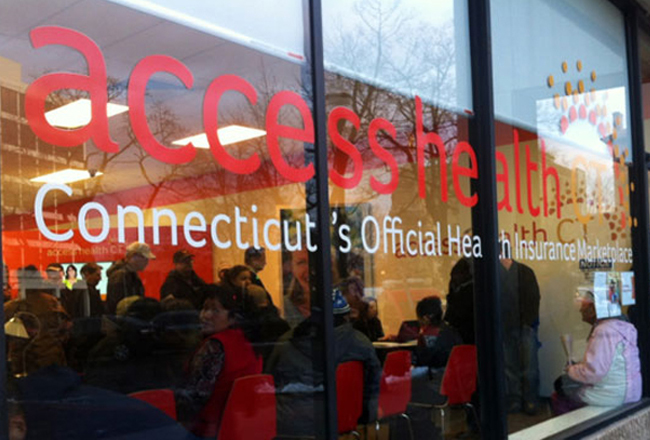By Cara Rosner
Open enrollment for 2020 health insurance plans begins Nov. 1, but consumers can already “window shop” among plans on the state’s health insurance exchange.
On Access Health CT’s (AHCT) website, accesshealthct.com, the health insurance exchange created by the Affordable Care Act, consumers can browse and compare options. Individuals can begin enrolling Nov. 1, for coverage effective Jan. 1, 2020. Open enrollment runs through Dec. 15.
For 2020, the exchange will again have two insurance carriers, ConnectiCare and Anthem.
The main questions on consumers’ minds typically is how much plans will cost. This year, that’s a mixed bag. A consumer impact study commissioned by AHCT recently reported that up to half of all exchange consumers – namely, those who receive federal subsidies for their insurance coverage – will see premiums decrease for 2020. But those who don’t receive subsidies are on track to have their monthly premiums rise an average of $116 per month, that same report found.

This year’s marketplace will hold more fairs for consumers.
Last month, the state Department of Insurance approved an average price increase on individual plans of 3.65 percent. Regulators approved an average increase of 2 percent among ConnectiCare plans, though the carrier had requested a 4.9 percent average increase. Anthem had asked to raise rates on individual plans an average of 15.2 percent, but regulators approved an average increase of 6.5 percent.
Consumers should look beyond premiums when choosing a plan, said AHCT Marketing Director Andrea Ravitz. Deductibles, co-pays and other expenses can significantly impact plans’ out-of-pocket costs.
“Just because premiums are going down does not mean that’s the plan for you,” said Ravitz.
During the 45 days of open enrollment, people without coverage can shop for insurance and those who have coverage can renew or change their plans. Consumers who don’t enroll in a plan by Dec. 15 will only be able to buy 2020 coverage later if they qualify for a special enrollment period. Only certain life events qualify consumers for a special enrollment, such as losing insurance coverage, getting married, having a baby or adopting a child.
In many cases, consumers who take no action before Dec. 15 will be automatically renewed in their current insurance plan.
AHCT officials expect roughly 111,000 to 115,000 – the same number as last year – to enroll in 2020 plans through the exchange, Ravitz said.
“We’re trying to make sure customers have a better experience, beginning to end,” she said.
To that end, AHCT is changing its outreach strategy this year. Last year the exchange opened seven centers offering in-person help and held 11 enrollment fairs throughout the state; this year there will be fewer centers and three times as many fairs.
“That’s a huge change from last year,” said Ravitz, noting brokers and AHCT staff typically serve far more people at fairs than at the centers. “It just makes more sense for us to be in a more mobile capacity.”
AHCT also will be more actively promoting the benefits of using brokers, who understand and can explain the pros and cons of various plans. Last year, about 43 percent of those who enrolled in exchange plans did so through brokers, meaning the majority did not, said Ravitz. Many people navigate the process entirely on their own online.
Representatives from both carriers will be on hand this year at enrollment fairs, which in the past have had just brokers and AHCT staff, Ravitz said. A list of locations and times for fairs can be found here.
To enroll, consumers can apply online, call AHCT at 855-805-4325, receive in-person assistance or use AHCT’s free mobile app. Last year, about 20 percent of consumers who enrolled in exchange plans did through entirely via a mobile device, Ravitz said.
While most people must wait until Nov. 1 to enroll in plans, enrollment in Medicaid HUSKY and the Children’s Health Insurance Plan (CHIP) is open year-round to eligible individuals and families.
Support Our Work
The Conn. Health I-Team is dedicated to producing original, responsible, in-depth journalism on key issues of health and safety that affect our readers, and helping them make informed health care choices. As a nonprofit, we rely on donations to help fund our work.Donate Now
Related Stories
- How C-HIT’s Christine Woodside reported this project Christine Woodside had long wanted to understand why sewage overflows regularly in some of Connecticut’s cities. She settled on the Bridgeport neighborhood of Black Rock, on Black Rock Harbor and near the promenades of Seaside Park.
More From C-HIT
- Disparities Growing Opioid Crisis Tests Limits Of Methadone Clinics; Advocates Favor Expansion
- Environmental Health Dead Fish, Condoms, Brown Foam: Sewage Has Chokehold On Black Rock Harbor
- Fines & Sanctions State Suspends Two Nursing Licenses, Disciplines Four Others
- Health Care Health Bills’ Failure A Bitter Pill For Health Care Proponents
- I-Team In-Depth Growing Opioid Crisis Tests Limits Of Methadone Clinics; Advocates Favor Expansion

